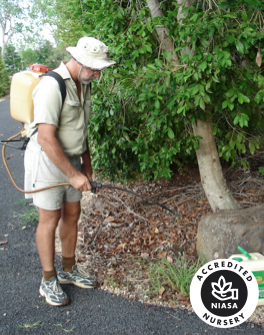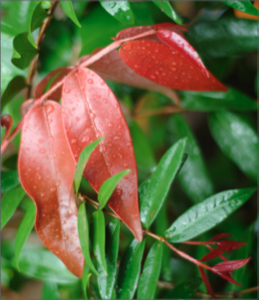Local North Queensland information for Local North Queenslanders.
It is most important to prevent grass and weeds growing around your plants and through your garden beds, since grass and weeds severely inhibit the growth of plants…
 Weeds
Weeds
It is most important to prevent grass and weeds growing around your plants and through your garden beds, since grass and weeds severely inhibit the growth of plants.
As a rule of thumb, you need to have a diameter of at least one metre free of grass and weeds around your plants if they are to grow well and establish. Think of commercial orchards …. farmers obviously wants their fruit trees to grow and yield to their maximum capacity …. and farmers keep at least a two-metre diameter of clear soil around all their trees.
To control weeds and grass:
- Prepare your soil thoroughly before planting, including killing all grass and weeds before you plant.
- Apply a thick layer of organic mulch around your plants to prevent weed growth.
- Monitor your plants regularly and kill any grass and weeds which come back near your plants. Do NOT allow weeds to go to seed.
- We do not advocate the wholesale use of chemicals.
 However, if you have a particularly bad weed problem which is difficult to control and which is inhibiting the growth of your plants, then a timely application of herbicide such as Round-up is very useful to bring your garden or plantings back into a manageable balance. Apply Round-up before the weeds go to seed. Do not allow Round-up to contact the green leaves or stems of your plants, and be careful of chemical drift. Round-up will not harm plants if it contacts brown woody tissue.
However, if you have a particularly bad weed problem which is difficult to control and which is inhibiting the growth of your plants, then a timely application of herbicide such as Round-up is very useful to bring your garden or plantings back into a manageable balance. Apply Round-up before the weeds go to seed. Do not allow Round-up to contact the green leaves or stems of your plants, and be careful of chemical drift. Round-up will not harm plants if it contacts brown woody tissue. - Once your plants have grown and started to form a canopy, grass and weeds will be shaded out naturally.
Disease
The worst disease you can have in your native garden is the root-rot fungal disease Phytophthora. This disease is carried in the soil, and is most commonly spread in nursery plants grown in unhygienic conditions. It is a very serious disease since it kills the roots of plants. Plants infected with Phytophthora wilt and die from lack of water even in wet conditions, since the roots can no longer function. Phytophthora is most active in the hot humid summer months, and infected plants can wilt and die very quickly, literally overnight.
The nursery industry accreditation scheme lays down strict guidelines for nursery production systems which minimise the occurrence and spread of this disease.

Your best protection is to buy only from accredited nurseries. Be warned … buying plants from back-yard nurseries at markets can be very dangerous.
If you do find this dreadful disease in your garden:
- Remove the affected plant and destroy it,
- Wash your hands and garden equipment before going to other plants,
- Treat the soil with a root-rot fungicide such as Fongarid,
- Mulch the affected area heavily with organic mulch, since mulch promotes the development of healthy micro-organisms in the soil which will help to keep the disease fungi under control.
- Improve the drainage of your soil and don’t replant until after the wet season.
Pest Control
One of the most common pests occurring on native plants are Scale Insects and the associated Sooty Mould. Scale insects secrete a sugary substance which encourages the growth of mould, making your plants look black, mouldy and unsightly. Scales insects are commonly spread by ants, so an infestation of scale and sooty mould can often be traced back to ants as the original cause.
Here’s how to treat scale and sooty mould:
- Kill the ants by applying an ant-killer at the base of the plant;
- Treat the Sooty Mould by pouring detergent-water over the plant,
- Kill the scale insects. You can use a commercial insecticide (browse the garden section of your local hardware store), or you can make your own.
Mix together 10ml of vegetable oil and 10ml of a cheap* detergent, stir until thoroughly mixed, then add to 1 litre of water, mix well, and spray over the affected parts of your plant.
The vegetable oil will smother the insects, and the detergent will wash off the mould plus kill the insects by destroying their waxy cuticle. You can apply this treatment as often as you like, as you cannot get resistance to this formula.
*Note: It is important to use a cheap detergent (eg Black and Gold brand) rather than more expensive brands such as Palmolive, since expensive brands have various additives to keep your skin looking good as you wash the dishes but which can damage the leaves of your plants. Cheap detergents on the other hand do not have additives and so are much safer on your plants.
Psyllids

Another common and unsightly pest of native plants (and lilly-pillies in particular) is psyllids.
These insect pests cause a raised pimply surface on the leaves, and spread rapidly to disfigure the entire plant. The only effective treatment is to cut off all the affected tissue and destroy it, then spray the plant with an insecticide.
Psyllids are not really a tropical pest, and plants produced locally rarely have this problem. Gardeners usually acquire psyllids by purchasing infected plants from nurseries which buy-in their stock from southern producers. You may not realise that thousands of nursery plants are trucked into north Queensland retail outlets every week from production nurseries in southern Queensland. A good reason to buy from local accredited nurseries!

